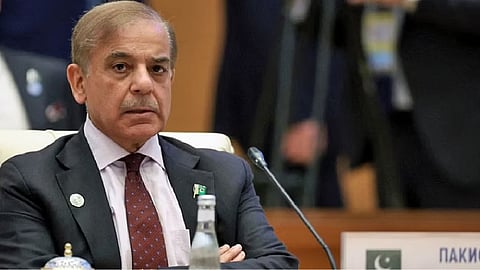

In a last ditch effort by Pakistan to put an end to the hostilities between Islamabad and New Delhi, Prime Minister Shehbaz Sharif extended an olive branch to India during a fund collection drive in West Asia. Claiming that Pakistan had learnt its lessons, after engaging with India in three wars, Sharif said that the two nuclear-armed nations should resume dialogue. Kashmir is on top of the agenda, along with the abrogation of Article 370, and the state of mishandled minorities in India.
The timing of Sharif’s appeal is telling, if one considers the economic implosion in Islamabad. Forex reserves held by the State Bank of Pakistan had plummeted to $4.34 bn — just about adequate to mitigate three weeks worth of imports. Last year, a flood affected more than a third of the nation and caused damages in excess of $40 bn while displacing over 8 mn people and handicapping its agricultural sector.
The skyrocketing inflation has also hit the 21-23% mark, and that is aggravating the shortage of essential commodities like food and fuel. Pakistan has now obtained guarantees from allies like China and Arab nations like Saudi Arabia and the UAE to help plug the deficit through humanitarian funding, which will take three to five years to fructify. Pakistan also must deal with fringe elements within and outside its borders.
The Tehreek-e-Taliban Pakistan has become a cause for heartache for the administration in Islamabad. Pakistan’s relations with neighbouring Kabul’s ruling dispensation, the Taliban is also nothing to write home about. Amid these developments, PM Sharif has chosen to bury the hatchet with New Delhi. But once bitten twice shy India has even more reasons to be wary.
For a nation whose leaders have made it their stock in trade to belittle New Delhi as the most politically safe option, amidst regime changes, this latest peace effort came with riders. The Pakistan PM’s office clarified a day after Sharif’s speech that talks could be initiated with India only after New Delhi reversed its illegal action of revoking Kashmir’s special status that was carried out on August 5, 2019.
Similarly, in June 2022, Pakistan’s foreign minister Bilawal Bhutto spoke in favour of normalising ties with India, at a time when Islamabad found itself internationally disengaged. It didn’t take more than six months for Bhutto to eat his words, as in December, he set off on a vitriolic tirade against Prime Minister Narendra Modi. Such about-turns seem characteristic of the regimes in Pakistan, which have further contributed to that air of distrust that lingers between the two nations.
As far as New Delhi is concerned, the issue of Kashmir, an internal one at that, is done and dusted. If there is any option to give peace a chance, Islamabad will need to actively disengage itself from all terror outfits operating out of its soil and subsequently dismantle all such operators and their launchpads. There is no urgency for India to respond to a call for ‘peace’ as the neighbours have so eloquently phrased it.
The primary objective is to maintain the status quo of ceasefire that has been followed on the LoC since February 2021. India also must note the dips in episodes of cross border infiltration that have been perpetrated by non-State actors in the country. Above all, India must learn to calibrate its expectations when it comes to anything to do with its neighbour, and play its diplomatic part like Bogart.
Visit news.dtnext.in to explore our interactive epaper!
Download the DT Next app for more exciting features!
Click here for iOS
Click here for Android